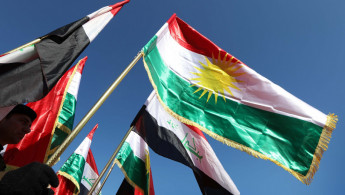High-level KRG delegation heads to Baghdad for talks over budget and security
According to Kurdish and Iraqi officials, top government officials from the Iraqi Kurdistan region visited Baghdad on Thursday, 14 September, to discuss outstanding issues with the federal government.
On Thursday, Prime Minister Masrour Barzani and Deputy Prime Minister Qubad Talabani of the Kurdistan Regional Government (KRG) led a governmental delegation and met with Iraq's Prime Minister Mohammed Shia al-Sudani, reported by Iraqi state media without further details.
The visit comes as KRG has yet to pay July salaries to its overwhelming public sector employees. It also coincides with efforts by both governments in Baghdad and Erbil to disarm and relocate fighters from the Iranian Kurdish opposition parties based in the Kurdistan region territories before an ultimatum by Iran that ends next Tuesday.
"Our aim is simple: defend the constitutional rights of the people in the Kurdistan Region of Iraq," Barzani wrote on X, the social media platform formerly Twitter.
Barzani on Thursday also met Iraqi President Abdullatif Rashid. "Our agenda focused on the situation in Kirkuk and Sinjar, in addition to the Erbil-Baghdad disagreements. I urged the President of the Federal Republic to use his powers as the protector of the Constitution," Barzani also wrote on X.
Today in Baghdad, I met with President @LJRashid. Our agenda focused on the situation in Kirkuk and Sinjar, in addition to the Erbil-Baghdad disagreements.
— Masrour Barzani (@masrourbarzani) September 14, 2023
I urged the President of the Federal Republic to use his powers as the protector of the Constitution. pic.twitter.com/UXszFpwX59
"Iraqi security forces appear to have opened fire on demonstrators without prior warning in Kirkuk on 2 September 2023, killing at least four people and injuring 16," Human Rights Watch said on 8 September.
The delegation is also set to meet with other Iraqi leaders from different political parties.
"The KRG is determined to ensure that the people of the Kurdistan Region receive their rightful financial entitlements, including their salaries, consistent with the rest of Iraq," said Peshawa Hawrami, KRG's spokesperson, as quoted by the KRG official website.
Iraq's parliament in June approved a three-year budget bill of nearly 198.9 trillion dinars (US$153 billion), the largest in the country's history.
According to the law, the semi-autonomous Kurdish region must first deliver 400,000 barrels per day (bpd) to the federal authorities, along with half of the non-oil revenues, before receiving a share of 12.6 per cent of the federal budget.
While KRG officials stress they have fulfilled their obligations under the budget law, Iraq has not sent its share from the federal budget, thus preventing the payment of KRG employees. Iraqi officials say Erbil has not fully abided by the law.
The KRG has said it needs 940 billion Iraqi dinars (US$602 million) to pay monthly salaries to over 1,200,000 civil servants but cannot do so if Baghdad does not regularly send its share from the budget.
The Iraqi government decided earlier this month to send 500 billion Iraqi dinars (US$320 million) as loans to the KRG to pay the salaries of its civil servants. However, the KRG has refused to accept the loan.
KRG employees, including teachers and healthcare staff, in Sulaimaniyah and surrounding towns have gone on strike to protest against delayed payments.
Sudani clarified on Monday that there is no such requirement in the budget law compelling the federal government to provide the salaries of the KRG public payroll. Still, the region has its share of the budget. He said his government cannot send the KRG's share for now because of complicated issues related to the region's oil and non-oil revenues.
Several KRG employees told The New Arab on condition of anonymity that the KRG has "politicised" and "hijacked" the issue of their salaries and could have accepted Baghdad's loan to pay them.
The Iraqi parliament will summon the finance and oil ministers in the Iraqi government and the KRG ministers of finance and natural resources to attend the assembly and clarify the budgetary and oil issues between both sides.
Iraqi Kurdistan began exporting its oil independently to Turkey without the federal government's consent in Baghdad in 2014.
Ankara had stopped handling 450,000 bpd of exports from Iraq's north on 25 March after an international tribunal ruled in a nine-year-old dispute that Baghdad was correct to insist on overseeing all Iraqi oil exports.
The tribunal, run by the International Chamber of Commerce (ICC), ordered Turkey to pay Baghdad damages of US$1.5 billion for allowing the Kurdistan Regional Government (KRG) to export oil between 2014 and 2018 without the Iraqi government's consent."





 Follow the Middle East's top stories in English at The New Arab on Google News
Follow the Middle East's top stories in English at The New Arab on Google News


